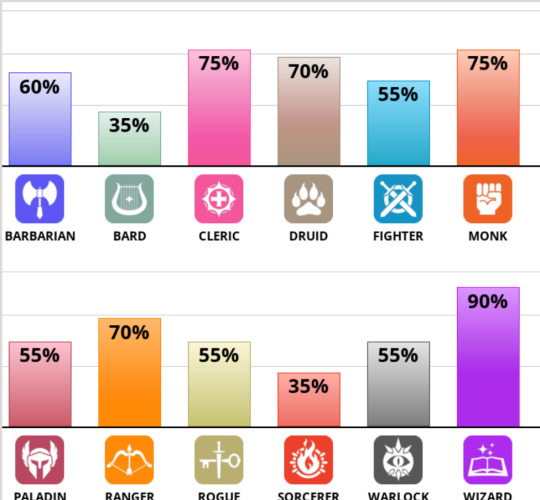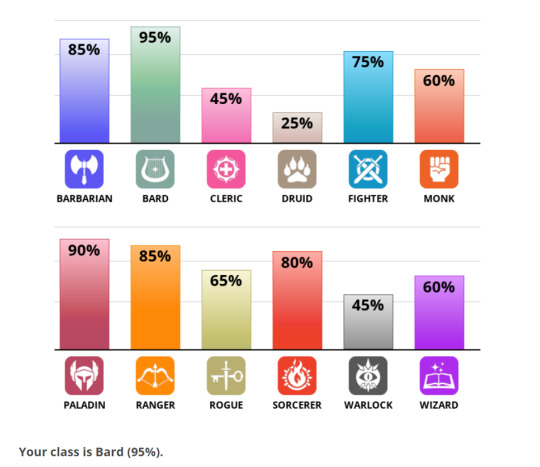Text
For every claim about Pagan survivals in European / North American folk traditions and holidays, it's important to remember that there are at least three layers of cruft on top:
Sixteenth- and seventeenth-century Protestants trying to discredit Catholicism by claiming that it was secretly Pagan
Nineteenth-century Romanticists and Nationalists trying to construct an "authentic" volkisch identity by connecting everything to a remote pre-Christian (pre-Jewish) antiquity, and
Contemporary Neopagans and New Agers who want to maintain these traditions.
9K notes
·
View notes
Text
Rb to give your deity a liddol kiss kiss on the nose as a thank you for everything :)
313 notes
·
View notes
Note
Heyy! If it’s not too much of a hassle what are some divination tips for tarot? Sometimes it feels like I am really good and than other times it’s like ehh
Sure, I could use a break before I start crocheting again 😅
I want to emphasize that tarot is one of those things where people really build up personal beliefs around it, so the following is in no way universal. It's all just what I currently feel and believe, heavily influenced by my beliefs as a spirit-working witch.
Most of the actual tips are at the end. I hope this helps!
Structures and Methodology
Tarot can't "magically" come up with valid answers no matter how it's put into use. It's a hammer and a screw situation; sometimes, using the tool incorrectly is less than useless.
Not all tarot spreads are very useful. The type of spread can have a huge influence on success. Try setting aside 'one question per card' spreads and see if that helps improve consistency in your results.
Not all tarot meanings are very useful. Tarot card meanings evolve and change over time. Modern meanings tend to be much more heavily skewed towards topics of introspection and self-help. Try reading books about the history and interpretations of tarot cards themselves to expand your understanding of each card. I recommend The Mystical Origins of the Tarot by Paul Huson for a strictly historical look.
Not all tarot questions are very useful. Learning how to phrase and frame questions, along with how to select a spread to place them in, are vital skills for the reader. Try focusing on strictly defined, open-ended questions.
Not every tarot deck is useful for every reader. It can come down to art and author meanings, but it can also come down to personal connection: a deck may work great for you for reading some types of questions, but fall flat on other types; or be more hit-or-miss. If you have multiple decks, try rotating between them or doing deck interviews to discover what types of questions they best address.
Memorizing the cards is not necessarily useful. It's not just that there are 78 cards, with 78 potential reversed meanings, each card in and of itself potentially having multiple meanings; it's also that depending on context, the core meaning can entirely change. Professional readers at events will pull out the guidebook and look up card meanings. There is no actual reason to try and memorize the cards unless you really just want to.
It's useful to have a map that helps navigate the cards. By adopting simple structures that paint large parts of the deck with broad meaning, interpretations can be easier to tackle. Another popular 'map' is the Fool's Journey.
You don't have to use the entire deck for every reading. Only using some parts of a deck to read is called reading with a restricted deck, and I really recommend practicing it as a way to develop a relationship with the deck structure. It can also be a very useful way to focus readings on one area of life (e.g., a new business venture reading may be read using only Wands and Pentacles).
That being said,
Check to see if cards are accidentally missing. Reading with a restricted deck is one thing, but I find my readings go weird if a card accidentally fell out and is lost.
You should take notes on your readings. I know it's a hassle, but the information you can glean and analyze from your own work is invaluable to figuring a lot of stuff out, like, what kinds of spreads work best for me? And what kinds of questions do I excel or fail at? Because next comes...
Energy and Individuality
Some questions are more draining or difficult to read than other questions. Here are my illustrated beliefs on the matter, explaining why some questions that seem straightforward can be nigh impossible to grasp. Try taking notes on the scope of the questions you can answer well.
Not all diviners are equally skilled at reading on all things. A diviner may have a special talent for certain types of questions (such as the outcomes of new ventures, or navigating the inner landscape), yet may fall flat when it comes to other questions (relationships or social intent, for example).
Any specific situation may have barriers to being read clearly. This is true even of mundane situations not expected to have magical influence. Sometimes, a certain situation, person, or concept will be shielded from view - and that can have nothing to do with the reader or querent.
Celestial timing may be a factor. Things like moon phase, time of year, or time of day can sometimes influence people's abilities to easily connect or easily interpret cards. Try paying attention to timing as part of note-taking and see if that's a factor.
Caffeine, drugs, alcohol, and rest can be a factor. Once I reach a certain level of fatigue (usually before bedtime) I can't read at all. Caffeine can sometimes also "close the veil" for me and limit me from being able to interpret readings. It might not be a factor for everyone, but it's something to pay attention to!
For practitioners, metaphysical workings can use up all available energy for divination. I find that my "pool" of magical energy feeds both my divination and my spellwork. Exhausting myself in one area (such as doing lots of energy work exercises) means I have exhausted myself in another area (no juice left for readings).
Witchcraft and Magic
Spells and wards can affect your ability to perform divination, sometimes in weird and unexpected ways. Go through spell notes to see if there is a chance prior, ongoing spells may be messing with your ability to read on certain questions. A big giveaway is when divination doesn't seem to work well specifically within a warded area, but this isn't a strict rule.
Prepare a place of reading, or reading cloth, enchanted to assist with finding answers. By consecrating and tending to such a place, such as a divinatory altar or divinatory reading mat, powers of far seeing, truth, and accuracy can be accumulated and much more easily raised. For those that have the space, a full divinatory altar can be an extraordinary tool. For such places, especially consider the power of symbols which open roads and gates.
Prepare a Charm of True Reading. Find, or develop, a small rhyme, charm, or prayer that calls on powers which support you and requests that your upcoming reading be clear and true. Repeat this before each reading, as desired.
Prepare an oil. A skin-safe carrier oil steeped with bay laurel, star anise, and lavender; or just bay leaf if the grocery store fails you, can be enchanted (especially under the full moon) to assist with opening the second sight and securing more accurate readings. Dab some on your forehead, ideally along with the Charm of True Reading.
Prepare a head covering. For some people, covering the head and/or partially blocking vision, can assist with entering divinatory headspace and with the receipt of visions and intuitive connections. As much as I like fancy things, I often end up using sunglasses and a hat. Being in a dark room might help as well, especially if you can get a candle in there.
Prepare incense. Here again bay laurel, star anise, and lavender can serve if you're able to powder and burn your own blends (remember to enchant them); but an enchanted stick of commercial incense will be fine (in any scent). Enchant the incense for the purpose of casting away doubt and influences that cause ill-sight, and to create an energetic haven where answers readily arrive to be interpreted by you, the reader.
Cast a circle. If you like to write your own rituals, especially focus on the concept of the circle being a liminal space between time that connects the worlds, almost like Grand Central Station where many threads of fate (and information) meet.
Consecrate your deck. Use any consecration ritual you like, but especially one that employs powers supportive of divination, true seeing, and psychism. This is almost certainly best done on a full moon. Consecrate your deck to be a tool which can peer into the threads of fate on your behalf, and then only reflect absolute truth back to you.
Enchant a tool to nurture and safeguard your decks. A lovely amethyst stone or clear quartz (or any variety of stone, bought or found), maybe one marked as special by putting it in a handy net, can be enchanted to be a protector of any deck it sits on. The value of this is to keep the deck enthroned in an additional layer of protection against untruth, but also to keep it bathed in energy related to divination and psychism. For those worried about decks getting magically "dirty," this is a good solution.
Also, cleansing decks sometimes is necessary, but it can be an easy operation. I find that spreading the entire deck face-down and mixing up all the cards in a big pile provides an adequate cleansing much of the time.
Spirit Work
Show your deck some love by providing it with offerings and a shrine, just as you would for an honored spirit. If the shrine isn't possible, an offering is excellent - maybe once weekly or monthly (depending on how often you use it), and even a small offering before each reading is useful. In my beliefs, this action goes far beyond making a deck happy with you - it can provide real, tangible effects on energy drain and the 'power' of your readings.
Petition gods, ancestors, or helper spirits. Beyond a Charm of True Reading, simply praying to helpful and benevolent powers to provide an assist can be really helpful. This is also an important way to develop a relationship with a guiding divinatory power. Speaking of which,
Get in good with a god or spirit who is associated with divination, psychism, etc. The Moon itself is a very solid choice. Apollo can see the future, and his buddy Bay Laurel (whom itself can be worked with as a divinatory spirit) can pack quite the punch. The dead are often said to be very good at helping with divination, but necromancy isn't for everyone. A witch who wants to become powerful in the ways of divination is wise to seek out helper spirits who are very good at this task.
Don't forget the gods and spirits of the thing you want to read on. If I wanted to know whether or not selling something online is worth the trouble, I might not just ask a far-seeing spirit to help me. I might also petition Hermes to grant me special insight into his domain. You can even use other spells you've cast (such as a prosperity spell) as a "foothold" into a certain area, but that's a whole topic in and of itself.
From time to time, a spirit may cause trouble. Divination can sometimes be interfered with by spirits who are upset with us. General offerings to appease offended spirits, or to make nice with the spiritual neighborhood around you, are well undertaken. They can be done even if you don't know that you've actually upset anyone.
130 notes
·
View notes
Text
Ambient Spells
The idea of the ambient spell isn’t so uncommon. My use of the word “ambient” may throw you for a bit of a loop. An ambient spell is any spell that permeates a space in an unobtrusive way. They affect the area surrounding their vessel and require little to no maintenance or upkeep. They’re long-term workings that require varying levels of effort to put together and cast. Depending on what exactly you need, they can be as simple as setting out a bowl of salt or as complex as crafting a home decor piece from scratch.
I always recommend making ambient spells that are self-fueling. I often refer to them also as “set it and forget it” spells. They’re the crockpot of spellwork — work up front for a slow burn output.
Chances are that you’re already aware of or even know how to create ambient spells. Any spell that affects the vibe of a room, for example, would count as an ambient spell. Lighting incense specifically to invite in positive energy counts. A ward that sucks up baneful magic and transforms it into blessings also counts. The primary idea of an ambient spell is that it’s making a change to your environment in the background. It’s the cool breeze in summertime, the subtle piano at a fancy restaurant, the scent of fresh-baked cookies fading as the day goes by. Positive, but not overt.
When to Use (or Not Use) an Ambient Spell
By their nature, ambient spells are fairly general workings. They can be quite powerful, of course, just like any other spell. The thing to keep in mind is that they’re not ideal for targeted magic.
For example, I wouldn’t create an ambient spell to banish someone from my life. I might make an ambient spell to make an area unwelcoming to them, or to anyone who would do me harm. The unwelcoming vibe might discourage them from coming around, sure. But it may not work outside of the area the spell lives in; and it may not get rid of them for good.
Similarly, an ambient spell might make a good general ward for keeping out loud, unwelcome spirits, but it wouldn’t specifically cast out the one particular spirit who’s been causing problems. It might discourage their behavior, but it wouldn’t necessarily get rid of them. A concentrated, single-use banishing spell would work significantly better for that purpose. Afterwards, an ambient spell can keep the area clear of that spirit’s influence.
I also wouldn’t use an ambient spell to draw in specific success. General success or money, absolutely — whatever wants to come my way is welcome, via a basic money bowl set up next to my wallet. But if I specifically want a promotion or a particular amount of money, I’m not going to leave that to the ambient money spell. I would craft a spell specifically for what I’m looking for.
When deciding what kind of spell to cast, keep this idea in mind. An ambient spell is best for behind-the-scenes results that happen without your concentrated effort. When you want something specific, a more targeted spell will work better nine times out of ten.
Creating an Ambient Spell
It’s possible to create an ambient spell with nothing but energy work. However, I often find that these fade quickly and don’t lend themselves well to self-fueling. They tend to need more active upkeep than I prefer for a spell that’s meant to be set and let go. I recommend choosing an appropriate vessel of some kind to contain the spell to help it last longer.
How do you decide what’s an appropriate vessel, though? And how do you set one up? How do you make a spell self-fueling? Let’s start from the top and go in order.
Identify the Purpose
Decide what the spell will do. This is going to define the components and the way you’re going to cast the spell.
In my experience, ambient spells work best when they’re given a single purpose. For example, I wouldn’t make a spell that’s a ward and a cleanser and a spirit welcome mat. It dilutes the purpose. Choose a single, clear motive for the spell.
Choose a Vessel
Now that you know what your spell will do, it’s time to decide what it’s going to look like. The vessel you choose should reflect the spell’s purpose in some way.
An open bowl works well for absorbing energy. Why? It’s open. The face of it is open to the room, ready to take in whatever kind of energy you assign to its contents.
A closed jar, on the other hand, would be good for repelling. It’s closed off and sealed — a one-way road going out of the jar and into the room to clear it.
A wreath hung at the door could serve a lot of purposes, depending on what it’s made with. I would use a wreath as an agent of transformation or as an energy emitter to release a certain energy into the space.
A stone makes a solid vessel for protection or grounding. I have one on my working altar to help keep me in the moment and create a good environment for working magic.
When you’re choosing your spell vessel, keep in mind how visible you want it to be. Certain vessels are going to naturally be more obvious than others. A wreath, for example, is hard to miss — but it also just looks like nice home decor. A jar full of herbs and things would be more obviously a spell, but they can be small and easily hidden.
I have both obvious and hidden ambient spells peppered around my home for varying purposes. If you’re keeping your practice a secret, you’ll likely want to keep your spells more obscure or hidden. But if you aren’t, and you can make the choice of whether you want the spell to be in plain sight or not, consider the effect you want the spell to have.
If you want the spell to absorb bad vibes, baneful magics, the evil eye, or other negativity, a hidden spell might serve you well. Hiding the vessel somewhere means that whoever’s casting against you may not expect the resistance. On the other hand, if you want a vessel that allows friendly spirits to visit you during the holidays, a beautiful centerpiece on your dining table that’s charmed with spirit-friendly magic might serve the purpose.
Choose an Energy Source
Ambient spells need to draw energy from somewhere. Think of it like a battery. The ingredients you put into the spell may provide a temporary charge, but if you want the spell to be long-term, it needs an input. How will your spell recharge itself?
If you want the spell to be shorter-term, only a few days or so, then you can skip this step. But if you want an ambient spell to last a while, like a ward or vibe-adjuster, you’ll need to think about this carefully.
Like when choosing the vessel, the energy source should match the purpose of the spell. For example, I have a simple room refresher spell set on a table that’s central to my home. The purpose of it is to take anxiety and negative thoughts to turn them into positivity. I set it up so that the act of walking past the bowl swirls the air around it, and therefore also the energy around it. That kinetic energy fuels the bowl’s magic and keeps it going. I don’t have to actively recharge the bowl or its contents, because we walk past it constantly.
Another example would be an ambient spell to help you do the dishes. (Whether that’s remembering to do them or finding the motivation for it is up to you.) The fuel for the spell could be the act of walking into or past the kitchen, running water elsewhere in the home, or even cooking or eating.
The energy source could also be something like lighting a candle next to or over the vessel on a schedule, if you prefer. This would add an upkeep step, of course, and wouldn’t be my first choice. The only ambient spell I do this with is my money bowl, and that’s because it’s tuned to be able to shift focus from day to day depending on what exactly I need (commissions versus tips versus discounts, etc.).
Setting Up an Ambient Spell
Decide where you want to place your spell’s vessel ahead of time. If you have pets or kids, make sure you put whatever it is out of their reach. If the vessel is something like an uncovered bowl, you’ll want to be sure that it isn’t going to get knocked over. Similarly, if it’s made of glass, you don’t want it to fall and shatter. If your vessel needs to be hidden somehow, determine where you’ll keep it. It would be smart to make note of where the spell is and what it looks like in your grimoire or spell notebook just so that if you forget about it, you can identify it later on down the road.
After you know where you want to put it, it’s time to choose ingredients and fill your vessel. The components you decide on should, obviously, match your goals.
Casting an ambient spell is much the same as casting a regular spell. The only thing to keep in mind is that an ambient spell has a sort of prolonged release.
Upkeep and Care of an Ambient Spell
For the most part, ambient spells should require little to no upkeep. With that said, you should still do routine check-ups on them. I include them in my regular rounds when I check on my wards and various protections, but you could do yours whenever it makes the most sense to you.
Depending on how you decided to fuel your spell, you may need to do a bit of feeding. Whether that’s lighting a new candle, refilling a cup of water, mixing around a pile of herbs, or giving the vessel a little shake, do so anytime it feels like the spell’s energy is flagging. It may take some practice in sensing energy to know exactly when a spell needs refueling. This is partly why I suggest creating a schedule to check in on the spell; ambient spells are a great type to practice sensing spell energy, since they’re typically long-lasting and may wax or wane depending on the day.
If your spell is fully self-fueling and it doesn’t seem to be working anymore (or at all, even from the start), it’s time to take it apart. Discard disposable components according to your practice’s tenets. Cleanse the rest for future use. I would suggest washing your spell vessel alongside magical cleansing.
A Ready-to-Use Example
Here’s an extremely simple example of an ambient spell I use in my home to keep the main living area light, fresh, and conducive to getting work done. Since both my partner and I work from home, it’s important that our areas have an aura of focus.
Materials:
- A small bowl, preferably green or brown
- Enough salt to fill the bowl halfway
- A few pinches of dried rosemary
Instructions:
1. Ensure the bowl is clean and dry. Pour salt into the bowl until it’s halfway full.
2. Sprinkle dried rosemary into the salt and stir.
3. Instruct the spell, in whatever way makes sense to you, to exude focused but calm energy into the space.
4. Place the bowl in an area that is frequently trafficked.
5. Leave the bowl in place until it no longer provides a fresh, focused energy to the space. Dispose of the contents, clean the bowl, and reset the spell.
Notes:
- This spell is powered by movement specifically, because both my partner and I work from home, and we pace when we’re having a hard time focusing. The spell draws in the energy from our pacing and the frustration we’re putting out to fuel itself. It then transforms and releases the energy as calm, focus, and productivity.
- I suggest a green or brown bowl because this spell is meant to work for our jobs. Green for success, brown for grounding. Personally, my bowl has both colors.
- When instructing the spell, you can speak to the bowl, write a petition, do an incantation, or whatever else you like. This is the most personal part of the spell, and it’s what makes the thing Go. It’s up to you to decide how it’s going to work.
Final Thoughts
I would hesitate to call ambient spells “low energy” spellwork. While they can be low-energy-friendly in the long run, and they can be extremely simple to set up (such as the one I described above), they aren’t always. Ambient spells do require an up-front energy cost. Even so, I find them very rewarding and useful.
Folks who visit my home often comment that it’s an inviting, friendly, good-natured space where they can leave their worries and anxieties behind. That’s on purpose. I’ve got ambient spells in place that eat up anxiety and spit out positivity. I’ve got ones that repel hexes and are charged by sunlight. All of these spells are long-lasting and well worth the effort it took to create them.
I hope this little guide is useful to you! If you’ve got questions, feel free to send me an ask. I’m happy to ramble about ambient spells or other types of magic as much as you’d like.
And if you did enjoy this post, consider dropping a couple dollars in my tip jar! Supporters of all types (tips, commissions, shop purchases, and memberships) get early access to posts like this, sometimes up to two weeks early, and every bit helps me keep the lights on.
532 notes
·
View notes
Text

90% Wizard is entirely unsurprising. Monk being 75% tho? wasn't expecting that
I was expecting anything but not Bard

17K notes
·
View notes
Text
Recently I've been doing a deep dive into red flags that one may run into while in occult spaces. It's best to be educated so that in the instance you come across one of these red flags, you know when take the information you're receiving with a grain of salt. The following is a list of some red flags I've come across in my time as a Pagan. Some are pretty obvious, others not so much.
• Claiming St. Peter's cross is Satanic, or that Ankh is Christian
• Thelema, Aleister Crowley, or Magic with a K
• "Qabala" rather than actual Kabbalah
• Talking about Atlantis as if it's real
• Saying "real Satanists" don't believe in Satan or refusing to acknowledge the difference between theist and non-theist Satanists
•Claiming a crystal, incense, oil, herb or whatever else can be used in place of medicine
• The use of lightning bolt symbols, the Black Sun, etc
• Saying aliens built the Egyptian pyramids or that humans bred with aliens
• Saying the Illuminati controls everything or talks of a "New World Order"
• Weird fear-mongering or out-there conspiracies about Freemasonry
• Vaguely alluding to an all-powerful group that's only ever referred to as "the elites" or "they"
• Doing closed practices they aren't apart of
• Refusing to cite sources, or if they do cite sources, it's a TikTok or something
• Referring to ANYTHING the Nazis did
• Tribal tattoos from a tribe one isn't apart of
• Claiming they'll provide you forbidden knowledge or that if you follow their way of life you'll reach God or whatever
• Any mention of Aryans or some superior race
• Joy of Satan or The Order of Nine Angels
• Claiming "you were meant to see this video!" when it's a video that is showed to hundreds (or thousands) of people based on an algorithm
• Gatekeeping practices, worship, tools, etc, from a sex. IE, "only women can do this spell!"
• Recommending any work from scammers (ex: Joe Dispenza)
• Discouraging learning the history of a practice
• Claiming deities from different pantheons are the exact same. (Ex: Aphrodite and Venus)
• Using AI in place of real art, imagery, people, etc. (Seriously, I've seen shops on Etsy try to sell me tarot readings with a photo of an AI generated old lady claiming to do the readings, marketing it as if it's a real person.)
If you have ANYTHING else to add, please feel free to do so.
2K notes
·
View notes
Text
#prev is a goblin#just feels like the type to be an actual dice goblin#also feels like they'd have a hoard of shinies
9K notes
·
View notes
Text
planning on going into detail later (when I get home from vacation) but I can't stop thinking about how much I noped away from a creepy tree in Savannah

0 notes
Text
Timeline of Occult Figures
Here is a non-exhaustive list of people you will likely come across in researching anything under Occultism.
These dates are not going to be 100% accurate because many of these folks have either lied about their age or for some reason or another we don't have solid records of them.
---
Pythagoras 570-490 BCE
Socrates 470-399 BCE
Plato 424/5-348/7 BCE
Aristotle 384-322 BCE
Apollonius of Tyana 15-97 CE
Pliny the Elder 23/24AD-79CE
Ptolemy 100CE-170CE
Galen 129-216CE
Zosimos of Panopolis ~beginning of the 4th century
Roger Bacon 1220-1292
Henry Agrippa 1486-1535
Nostradamus 1503-1566
John Dee 1527-1608
Paracelsus 1593-1608
Jacob Grimm 1785-1863
Eliphas Levi 1810-1875
Helena Blavatsky 1831-1891
A. E. Waite 1857-1942
Margaret Murray 1863-1963
Aleister Crowley 1875-1947
Gerald Gardner 1890-1946
Robert Graves 1895-1985
Austin Osman Spare 1886-1956
Scott Cunningham 1956-1993
---
This is a re-upload because I can't find the original post I made so any additions made on that post have been lost. Please let me know if you have suggestions!
218 notes
·
View notes
Text
Epithets of Hypnos 💤
per request of @khaire-traveler and @kattyjonestardis!! thank you both!
Επιδοτες (Epidotes) — bountiful
Αλετες (Aletes) — vagabond, vagrant
Αχλυοεις (Akhlyoeis) — dark, gloomy, dismal, shadowy
Ομοοτολος Ερωτων (Omootolos Eroton) — servant/attendant of the Erotes
Πανδαματωρ (Pandamator) — all-vanquisher, all-subduer, all-tamer
Νηδυμος (Nedymos) — sweet, delightful
158 notes
·
View notes
Text
The humans in Greek Mythology are the mega rich and powerful:

In my college classes people are often shocked when I tell them my favorite part of Greek mythology is the gods themselves and I'm not a big fan of the humans.
99% of my classmates prefer the humans in mythos, especially the ones that stick it to the gods like Sisyphus and feel bad for humans like Kassandra and Helen who have been wronged by the gods because "they're just like us." My classmates and teachers hate the gods and don't understand why anyone in modern times would want to worship such violent and selfish beings whenever I point out there are still people who worship them. They hold onto the idea that people in mythology embody the human experience of being oppressed by terrible gods and fate and we should feel bad for them because "they're human just like us" but they forget that the people in Greek Mythology are NOT just like us. They are more relatable to medieval royalty, colonizers and ultra rich politicians who make laws and decisions on wars and the fates of others, especially the poor and the very vulnerable.
Every hero or important human in Greek Mythology is either some form of royalty or mega rich politician/priest-priestess (of course this is with the exception of people who are explicitly stated to be poor like the old married couple in the myth where Zeus and Hermes pretend to be panhandlers). All of them have an ancient Greek lifestyle more relatable to Vladimir Putin, Donald Trump, and especially to British royalty during the British empire, than the average person.

All of them.
Odysseus, Patroclus, Theseus, Helen of Troy, Kassandra, Diomedes, Agamemnon, Perseus, Hercules, Aeneas, Paris, Any human who has a divine parent or is related to one, etc. Although sometimes the story omits it, it is heavily implied that these are people who own hundreds or even thousands of slaves, very poor farmers and the tiny barely there working class as royal subjects.
They are the ones who make laws and whose decisions massively affect the fates of so many people. So no, they can't just be forgiven for some little whim, because that little whim affects the literal lives of everyone under their rule. By being spoiled they've just risked the lives of thousands of people and possibly even gotten them killed like when Odysseus' audacity got every single slave and soldier in his ships killed or when Patroclus as a kid got upset and killed another kid for beating him at a game. (A normal person wouldn't kill another person just for winning a game but royalty and those who think they're above the law do it all the time, plus the class status of the child wasn't mentioned but the way he didn't think he'd get in trouble implies the kid was of lower class, possibly the child of a slave or a foreign merchant.)

The gods get a bad reputation for punishing the humans in mythology but, if not them, who else is going to keep them accountable when they are the law?
And whose to say the humans beneath them weren't praying to the gods in order to keep their masters in check?
Apollo is the god of slavery, Zeus is the god of refugees, immigrants and homeless people, Ares is the protector of women, Artemis protects children, Aphrodite is the goddess of the LGBT community, Hephaestus takes care of the disabled, etc. It wouldn't be surprising if the gods are punishing the ultra rich and powerful in these myths because the humans under their rulership prayed and sent them as they did historically.
Every time someone asks me if I feel bad for a human character in a myth, I think about the many lives affected by the decision that one human character made and if I'm being completely honest, I too would pray to the gods and ask them to please punish them so they can make more careful decisions in the future because:
They are not just like us.

We are the farmers, a lot of our ancestors were slaves, we are the vulnerable being eaten by capitalism and destroyed by the violence colonialism created. We are the poor subjects that can only pray and hope the gods will come and correct whatever selfish behavior the royal house and mega rich politicians are doing above us.
And that's why I pray to the gods, because in modern times I'm dealing with modern Agamemnons who would kill whatever family members they have to in order to reach their end goal, I'm dealing with everyday modern Achilles who would rather see their own side die because they couldn't keep their favorite toy and would gladly watch their subjects die if it means they eventually get their way. The ones that let capitalism eat their country and it's citizens alive so long as it makes them more money. These are our modern "demigods," politicians who swear they are so close to God that they know what he wants and so they pass laws that benefit only them and claim these laws are ordained by God due to their close connection just like how Achilles can speak to the gods because of his demigod status via his mother.
Look at the news, these are humans that would be mythical characters getting punished by Greek gods which is why anything Greco-Roman is jealousy guarded by the rich and powerful and is inaccessible to modern worshippers because Ivy League schools like Harvard and Cambridge make sure to keep it that way. That's what we're dealing with. These are the humans these mythical beings would be because:
In our modern times the humans in mythos would be the politicians and mega rich that are currently ruining our society and trying to turn it into a world where only the rich can manipulate wars and laws, just like they do in mythology.
Fuck them.

I literally have so much more to add about my disdain for them and I didn't even touch on the obvious ancient Greek propaganda.
458 notes
·
View notes
Text

Okay but what if people started offering the balls to Apollo in hopes of their posts coming true
1K notes
·
View notes
Text
Reminder that if somebody offers to bless your valuables or tells you that you have a curse that they can remove (for a price), you're probably dealing with a scammer - blessing and curse-lifting scams are a thing.
21 notes
·
View notes
Text
"Aphrodite loves terfs" do you really think a goddess of love formed from a literal penis and the mother of Hermaphroditus, an intersex god who was associated with androgyny and feminine men, fucks around with transphobia?
she is a literal trans icon and to deny that will get you smited by all the gods
36K notes
·
View notes
Text
Types of Witches Masterpost
I’ve seen several of these passed around, but they always feel incomplete. I’ve decided to put together my own version. I hope this is helpful.
Religious WItches - Witches who practice within a religious practice (like Wicca)
Secular Witches - Witches who practice outside of a religious practice.
Solitary Witches - Witches who practice alone
Sonicary Witches - Witches who only exist as the concept of sound
Tweed Witches - Witches who are really into elbow patches
Sandwiches - like a good ham and cheese one would be pleasant now.
Cranberry Witches - Best served at Thanksgiving
Forest Witches - They are in the woods, right now, totally lost
Steve Witches - These are witches named Steve. They tend to collect Dreamcast games and are generally okay unless they’ve been drinking.
Sea Witches - They work with water
C Witches - scpell everytching wcith unecesscary C’s
Gray Witches - only wear the color gray.
Grey Witches - Like Gray witches, only more pretentious
Fae Witches - Witches who work with Fairies
Witches Near Fae Witches - just waiting to see if the Fae Witches weren’t careful enough when they made their deals with the Fae.
Booze Witches - Do their best witchcraft drunk, or at least that’s what they tell you when they ask you to hold their beer. This is what Steve thinks he is. He isn’t. Steve has a problem.
Kitchen Witches - People you should be friends with around thanksgiving
Garden Witches - Work with plants, stronger than they look, seriously – don’t try to fight them. God damn it Steve, leave her alone.
Healing Witches - The people you take Steve to after he pisses off the Garden witches.
Hedge Witches - These are Witches who work with Hedges.
Did I miss anything?
7K notes
·
View notes
Text
In Modern Day...
Hera would be the Goddess of Women and all that is necessary for them to survive. She stands for battered women, single mothers, and the children they must raise. She is the giver of healthy marriages, certainly. But her hearts beats the same song as any woman hurt by her lover... and like hell she is going to turn away from protecting them.
Hestia would be the Goddess of Home, as it has expanded with the times. Suddenly, she is playing the economic game. Suddenly, she is counting pennies and dimes. Suddenly, she has become a manager just as much as a homemaker. Her focus is safety above all else and with the way the times are developing, she keeps everything closer to the vest than ever. No one will take her solitude, and if you wish for the same, she is the one to reach out to.
Demeter would be the Goddess of the Environment. The cycles are in disarray. The flora, fauna, and fae howl in pain. It used to be so easy when she just had to educate people, when the worst threat to their lives was the winter winds. But the threat of death is more insidious now, and it is by her mortals' own hands. To find stability again, she will work through every mind and soul she can to restore order. To restore the environment. How else are her mortals going to survive?
Athena is the Goddess of War. And she is sick of it. Humanity can't seem to learn their lesson that diplomacy comes first. They can't seem to learn that if war must be waged, it must be waged cleanly and effectively. She works with other pantheons, with Christianity, with spirits all over to create a network to prevent humanity from nuking itself. She works through activists, presidents, politicians, and leaders. If she can get her hands into economy, government, state, maybe she can prevent annihilation from the ground up.
Artemis would be the Goddess of the Wilds. She is not going to change just because the world is demanding to be changed. Nature was here billions of years before modern civilization and it will survive long after. She has to hold strong, be the steady factor in all of this. Every soul returns to her eventually, even for a little while, to remember who they are. The only way their wildness can show is if she maintains her authenticity as well. That is her mission as Goddess, always and forever.
Persephone would be the Goddess of Healing. In the old days, she had no name. She was known as her mother's daughter, as her husband's queen. But now, for the first time in humanity's history, mental health is a thing. Generational trauma howls out the pain of the ancestors. The world is at a tipping point, where they will either collapse or heal. Persephone has tasted it all. All her pain and all the pain of the souls that have entered her halls. If she can be reborn from all of that, she will make sure all who pray to her and her domain (underworld, healing, spring) will taste that same hope too.
Aphrodite would be the Goddess of Love, and she will be the most brutal of all. It disgusts her, the way the world functions now. They want to hate each other, abandon each other, leave it all behind, and then they all wonder why they are all alone. She is the last force between this society and pure hatred taking over. She will dig her heels in the sand and her hands into the consciousness of any who hear her... Love... and make them feel it. Over and over and over. Until they get it.
8 notes
·
View notes





